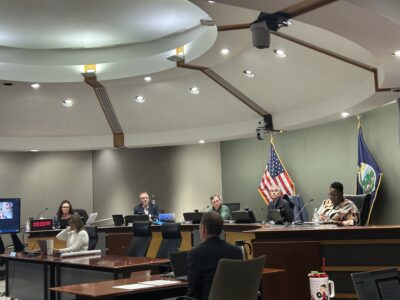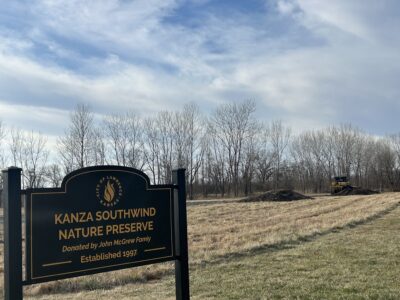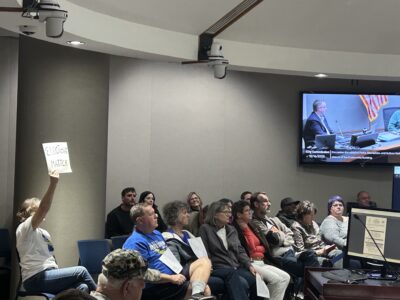New driver’s license requirements causing headaches for some in Kansas

photo by: Kansas Department of Revenue
A new Kansas driver's license design, announced Thursday, Aug. 3, 2017, includes either a gold circle with a white star cutout proving the holder is lawfully in the U.S. and that it is acceptable federal identification, or the words not
Topeka ? In September 2017, Gretchen Underwood went to the driver’s license office in Lawrence to do something she had done many times in her life without much hassle: She went to renew her driver’s license.
However, little did the 78-year-old Lawrence woman know at the time that only a month earlier, the state of Kansas had adopted a new form of driver’s license that requires much more documentation than had ever been required before.
Underwood said she has been trying for the last four months to get her new Real ID license but so far has been unsuccessful because none of the documents she has produced meet the standards that are now required.
“It’s frustrating. Completely frustrating,” she said in a phone interview Friday. “I can’t imagine why this is necessary. I’ve had these documents all my life and they’ve been fine. Why aren’t they fine now?”
The new licenses are intended to comply with a federal law, known as “Real ID,” that was enacted in 2005 but that will kick into full force in October 2020. That law requires state-issued driver’s licenses and ID cards to meet certain standards in order to be used for conducting official business with the government.

This sample image shows a new Real ID driver’s license. The licenses, intended to comply with a federal law that requires driver’s licenses to meet certain standards, are distinguished visually from old licenses by a star in the upper right corner.
Those licenses are distinguished by a circle with a yellow star in the upper right-hand corner of the document, a symbol that indicates the license meets federal standards and can be used for official business.
People who either aren’t able or don’t want to go through the process still have the option of doing what Underwood said she had to do as a short-term solution: obtain a standard license that doesn’t meet Real ID standards. But starting Oct. 1, 2020, those licenses will not qualify as valid identification for certain purposes such as boarding a plane or entering a military base.
Licenses that don’t meet the federal standard will be marked with the words “not for federal ID,” and people using those licenses will have to produce another form of ID, such as a passport, to pass through airport security or a military post.
At a minimum, according to the Kansas Department of Revenue, to obtain a Real ID driver’s license, people now must show a valid passport or birth certificate — one that is not laminated and has an official state seal that is raised; and proof of a Social Security number — either an official, nonlaminated card or a recent pay stub or a tax document such as a W-2 that bears the person’s full Social Security number.
People who are not U.S. citizens or who were not born in the United States can show an unexpired permanent residency card or work authorization card, a naturalization certificate or a consular report showing that they were born abroad.
In addition, people also must show proof of Kansas residency, such as a current driver’s license, a utility bill dated within the past 90 days or a vehicle registration.
But for people like Underwood, who was born in Minnesota, got married in Iowa and lived in other states before settling in Kansas in the 1970s, even that may not be enough.
That’s because, in addition to all of those requirements, anyone who has ever changed their name — because of marriage, adoption or any other reason — also must show legal documents explaining the name change.
“Then they told me I needed my marriage license, because my Social Security name didn’t match,” she said. “So I got all that and went back (Wednesday) and was told that my birth certificate wasn’t the correct one, even though I’ve had it all my life. So I have to contact Minnesota and get a different one.”
The new licenses require an official, state-issued birth certificate, not a hospital certificate, which is not an official document.
“And then my marriage license too, which I’ve always used for identification, wasn’t the one they wanted either,” she said, “so I have to contact the state of Iowa and get that done.”
In addition, Underwood said, she has to obtain a new Social Security card because the one she has now shows only her middle initial, not her full middle name.
Rachel Whitten, spokeswoman for the Kansas Department of Revenue, said she has heard a number of similar stories since the new licenses debuted in August. And as a result, she said, the department plans to roll out an advertising campaign starting this coming week to make people more aware of the new requirements.
“It can be tricky. You’ve got people who are used to doing things one way, and so now we’re trying to get the word out,” she said in an interview. “We’re making every effort to get it out, but certainly we know there are always ways we can improve, and that’s what we’re doing.”
Whitten said the ad campaign initially will include only digital ads spread through social media networks, but she said it could expand later to include public service announcements on radio and television.
- A new Kansas driver’s license design, announced Thursday, Aug. 3, 2017, includes either a gold circle with a white star cutout proving the holder is lawfully in the U.S. and that it is acceptable federal identification, or the words not
- This sample image shows a new Real ID driver’s license. The licenses, intended to comply with a federal law that requires driver’s licenses to meet certain standards, are distinguished visually from old licenses by a star in the upper right corner.







